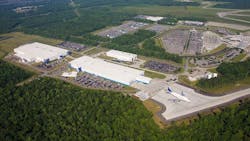After a rocky start, Boeing Co. (IW 500/9) Chief Executive Officer Dennis Muilenburg appears to have gained the ear of President Donald Trump.
The U.S. planemaker was one of Trump’s first post-election corporate targets, and a tweet about soaring Air Force One costs briefly tanked the company’s shares in December. But the Twitter tirade also gave Muilenburg an opening to press the case of the largest U.S. exporter -- and the 1.5 million jobs at its jet-equipment suppliers -- in meetings with Trump.
The CEO’s entreaties seem to have worked. Trump has emerged as a booster for Boeing’s F/A-18 fighter jets and voiced support to lawmakers for a key Boeing initiative: re-opening the U.S. Export-Import Bank for major deals. Trump will fly to Boeing’s South Carolina factory to attend an event Friday showcasing the newest 787 Dreamliner, where he’s expected to make an announcement about the federal export credit agency.
“The supply chain for Boeing doesn’t just run through the state of Washington,” said Howard Rubel, an analyst at Jefferies. The Ex-Im Bank is “a door opener.”
Supporting the lender would put Trump at odds with some fellow Republicans, who view the bank as providing corporate welfare.
Ex-Im has been dubbed the “Bank of Boeing” for the backing it has given to aircraft purchases by airlines unable to tap conventional credit markets. But it’s been blocked from providing loan guarantees of more than $10 million because it lacks a board member whose nomination has been stuck in a Senate committee since 2015.
Committed to a Quorum
Trump is committed to reestablishing a quorum on the bank’s board, U.S. Senator Heidi Heitkamp, a Democrat from North Dakota, said after a Feb. 9 bipartisan lunch meeting between the president and lawmakers. That’s needed to allow the bank to lend more as it faces a backlog of as much as $30 billion in projects.
Boeing and General Electric Co. have argued that without the financing, they would face a competitive disadvantage against companies in Europe, Canada, Brazil, China and Russia, which don’t face similar restrictions.
With the bank hobbled, U.S. manufacturers have been forced to turn to private banks or export credit banks from other countries where they operate to help customers finance big-ticket purchases. Boeing has lost or faces delays on three commercial satellite sales because of the lack of export credit, said Kate Bernard, a spokeswoman for the Chicago-based manufacturer.
“It’s put us at a significant competitive disadvantage,” Bernard said.
Critics argue that the Ex-Im Bank’s guarantees are heavily weighted toward a few large companies and the U.S. government could potentially be on the hook if borrowers default.
In 2014, 40% of all authorizations went to Boeing alone, according to an analysis by George Mason University’s Mercatus Center. Other beneficiaries range from GE to Bechtel Group Inc.
“I don’t blame companies like Boeing, Bechtel and GE for using Ex-Im or benefiting from Ex-Im,” said Diane Katz, a senior fellow at the Heritage Foundation, which favors limited government. “But we don’t have to give them the opportunity to do that on the backs of taxpayers.”
GE had contracts valued at $11 billion that required Ex-Im Bank financing in 2015, when reauthorization of the bank lapsed. The company rushed to form partnerships with export credit agencies in Canada, the U.K., France and other countries to meet those needs, said Una Pulizzi, a spokeswoman for GE.
A representative of Bechtel didn’t respond to a request for comment left outside normal business hours.
The Bank is Profitable
Ex-Im Bank’s quarterly default rate was 0.27% at the end of September, well below the mandate by Congress. The bank is also profitable, returning $284 million to the U.S. Treasury last year and $675 million in 2014 when it was fully operational. The lender estimates it supported almost 165,000 U.S. jobs in 2014.
If U.S. contractors can’t find Ex-Im Bank financing for U.S.-made equipment needed on an overseas projects, they will shift purchases to a country where the guarantees are available, said William Schubert, president of International Trade & Transportation Inc., which helps borrowers find government-backed credit.
“When that happens, all the U.S. procurement disappears,” Schubert said. “I know people who are unemployed right now because the bank is down, and that’s unfortunate.”
By Julie Johnsson, Thomas Black and Austin Weinstein
About the Author
Bloomberg
Licensed content from Bloomberg, copyright 2016.
